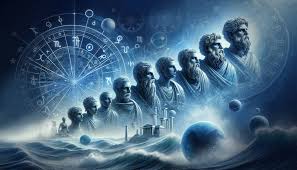For millennia, humans have sought to understand their place in the universe. Across cultures and continents, religions have emerged—complex systems of faith, myth, and ritual that give meaning to life, death, and the mysteries beyond. But what if religion, at its core, is deeply rooted in something much older and more universal: the zodiac system? What if the stars and their patterns in the sky laid the groundwork for the spiritual beliefs we follow today?
The Ancient Sky as a Spiritual Map
Long before written history, ancient peoples gazed upward and noticed regular patterns in the night sky. The twelve zodiac signs—Aries, Taurus, Gemini, and so on—represent constellations that circle the Earth along the ecliptic path of the sun, moon, and planets. These signs became more than just markers for seasons or agricultural cycles; they evolved into symbols that encoded human traits, destinies, and cosmic laws.
Astrology, the study of how celestial bodies influence human affairs, can be seen as one of humanity’s earliest attempts to connect earthly life to the heavens. The zodiac signs became archetypes—templates for understanding personality, fate, and morality. The stars were no longer just distant suns but living symbols, divine forces shaping human existence.
From Zodiac Archetypes to Divine Figures
Many religious stories and gods seem to echo zodiac archetypes. Consider how deities often embody qualities that align with zodiac traits: courage and leadership linked to Aries; nurturing and abundance related to Taurus; duality and communication connected to Gemini. These symbolic connections suggest that the gods and spiritual figures might have originally been personifications of the zodiac signs themselves.
In this light, religion can be viewed as an elaborate mythological system built on the foundation of zodiac symbolism. The twelve signs offered a cosmic template to explain human nature and the universe. Early priesthoods may have used these symbols to craft narratives about creation, morality, and the afterlife, embedding star wisdom into sacred stories.
The Zodiac as a Framework for Moral and Spiritual Order
Religions often provide moral codes and spiritual guidance. These can be interpreted as extensions of the zodiac’s influence on personality and destiny. Each sign’s qualities suggest certain virtues and vices, which then translate into religious teachings about how to live rightly.
For example, the balance embodied in Libra may have inspired principles of justice and fairness found in many faiths. The transformative energy of Scorpio might echo spiritual themes of death and rebirth, which are central in various religious rituals. The zodiac’s cyclical nature—birth, death, renewal—mirrors the fundamental spiritual cycles religions teach.
The Universal Language of the Stars
One of the most compelling reasons the zodiac could have given rise to religion is its universality. Unlike localized myths tied to a particular tribe or land, the stars are visible to nearly all human societies. The same constellations and cycles can be seen worldwide, making the zodiac a shared cosmic language.
This universality could explain why religious themes—creation myths, moral codes, eschatology—appear strikingly similar across disparate cultures. It hints that the zodiac system was a common thread weaving through early human consciousness, eventually evolving into the diverse religions we recognize today.
Modern Religion and the Zodiac: Echoes of the Past
While organized religions have developed complex dogmas often detached from astrology, echoes of the zodiac remain. Religious calendars align with solstices, equinoxes, and lunar phases—all tied to celestial movements central to the zodiac. Saints, angels, and spiritual beings often carry attributes linked to zodiac traits.
Even in contemporary spiritual practices, astrology and religion sometimes intertwine, reflecting an ancient connection that still resonates. This suggests that the roots of religion in the zodiac system are not merely historical but enduring, influencing how humans find meaning even today.
Conclusion: A Cosmic Origin for Faith
The idea that religion grew out of the zodiac system invites us to reconsider faith not only as a cultural or psychological phenomenon but as a cosmic dialogue. Our ancestors looked to the stars for answers and found in them a mirror for the human soul. From those stellar patterns blossomed myths, gods, and spiritual laws—the building blocks of religion.
In essence, the zodiac may have been the original scripture, the first sacred text written across the heavens. Understanding religion through this lens enriches our appreciation of spirituality as something profoundly linked to the universe itself—a reminder that our search for meaning has always been, quite literally, written in the stars.
Help keep this independent voice alive and uncensored.
Buy us a coffee here -> Just Click on ME










